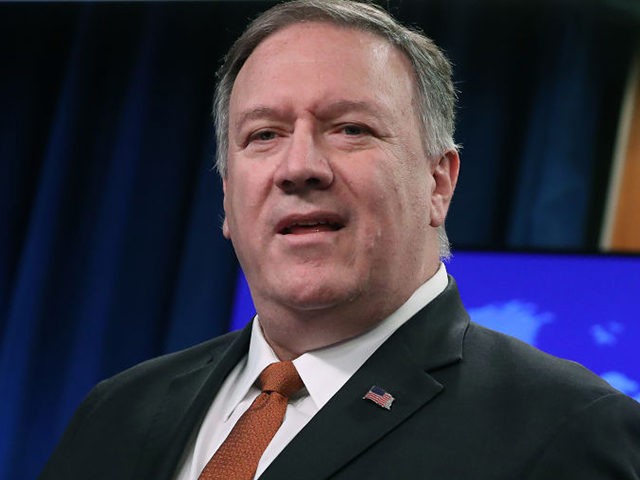The Chinese Foreign Ministry on Tuesday lectured U.S. Secretary of State Mike Pompeo about “sowing discord” between China and its neighbors.
Pompeo is currently visiting India with Secretary of Defense Mark Esper, after which he will travel to Sri Lanka and the Maldives.
Chinese Foreign Ministry spokesman Wang Wenbin said on Tuesday that “Pompeo’s attacks and accusations against China are nothing new.”
“These are groundless accusations which reflect that he is clinging to the Cold War mentality and ideological biases. We urge him to abandon the Cold War and the zero-sum game mentality and stop sowing discord between China and regional countries, as well as undermining the regional peace and stability,” said Wang, repeating just about every Chinese propaganda catchphrase and slogan in the space of about thirty seconds.
Wang was referring to Pompeo’s warning in August that China is becoming a worse threat to freedom than the Soviet Union was during the Cold War.
“The Chinese Communist Party (CCP) is already enmeshed in our economies, in our politics, in our societies in ways the Soviet Union never ways,” he remarked.
China was doing a tremendous job of alienating India long before Pompeo got there, as Chinese and Indian forces are locked in a tense stalemate along their Himalayan border. Pompeo is in India to finalize a bilateral military pact that will give India access to U.S. military satellite data.
“I am glad to say the United States and India are taking steps for cooperation against all manners of threats and not just those posed by the Chinese Communist Party,” Pompeo said from New Delhi on Tuesday.
“Our leaders and our citizens see with increasing clarity the CCP is no friend to democracy, the rule of law, transparency, the freedom of navigation — the foundation of a free and prosperous Indo-Pacific,” Pompeo continued.
Pompeo said the “2+2” talks he and Esper held with their Indian counterparts, Foreign Minister Subrahmanyam Jaishankar and Defense Minister Rajnath Singh, were highly productive and presented “a new opportunity for two great democracies like ours to grow closer.”
“There is much more work to do for sure. We have a lot to discuss today: Our cooperation on the pandemic that originated in Wuhan, to confronting the Chinese Communist Party’s threats to security and freedom, to promoting peace and stability throughout the region,” he said.
Esper welcomed cooperation with India to “meet the challenges of the day and uphold the principles of a free and open Indo-Pacific well into the future.”
The Indian military announced on Tuesday that it will create five integrated theater commands by 2022. One of them will be devoted to the border with China, another will focus on the border with Pakistan, and a “marine command” will help fulfill Esper’s vision of U.S. and Indian cooperation on the freedom of navigation.
Last week, India invited Australia to join annual naval drills with the United States and Japan to be held in November. India and the U.S. have been holding the Malabar naval exercise since 1992, while Japan joined in 2015.
The Indian Defense Ministry said it was reluctant to grant Australia’s request to participate in 2017, but changed its mind this year after growing bilateral cooperation with Australia and mounting tensions with China. The U.S. and Japan welcomed Australia joining the new “Quad” version of the Malabar exercise.
“What those four countries can bring to bear in diplomacy, in economic power, in the sharing of values that underline all the free and open Indo-Pacific visions that each nation has put forward, which are well overlapping,” U.S. Indo-Pacific Commander Admiral Phil Davidson said of the Quad’s ability to counter Chinese aggression in the region.
Davidson added he was “encouraged” to see India purchasing advanced naval equipment that would integrate smoothly with the systems employed by the U.S., Japan, Australia, and South Korea, including P-8 maritime patrol aircraft and the Aegis defense system.
China protested the Quad as a threat to regional stability. Pompeo said at an early October meeting in Tokyo that he hoped India, Japan, Australia, and the United States could work together against the Chinese Communist Party’s “exploitation, corruption, and coercion” while promoting a shared vision for “a free and open Indo-Pacific, composed of nations that are independent, strong, and prosperous.”

COMMENTS
Please let us know if you're having issues with commenting.